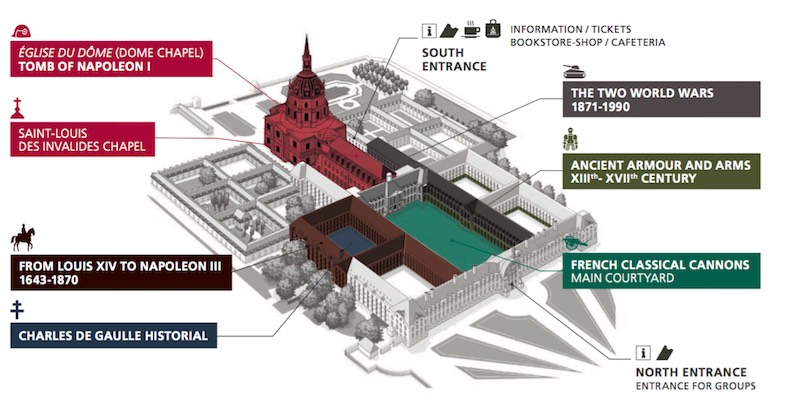Napoleon Bonaparte
Fun Fact
It has been proved that Napoleon suffered for years with gallstones and died as a result of complications from a malignant stomach tumour – without Hudson Lowe or Montholon having to poison him. Thankfully a new conspiracy theory about his body’s disappearance has appeared lately. The proponents of the theory that an unknown corpse was substituted for Napoleon’s – such as the body of his butler, Cirpriani, who died at Longwood – have such fertile imaginations for discovering new “proofs” of this theory that it is once again necessary to put a stop to this hypothesising using the tools of historical accuracy and cold, hard fantasy-free logic. So one more time – Napoleon I is truly buried at Les Invalides.
Some believe that the horse skeleton is that of Marengo – Napoleon’s favorite Arabian horse. Actually the real skeleton, which is usually on display at London’s National Army Museum, was too fragile to display hanging from the ceiling so a composite model was created and Memento Marengo is what now hangs from the ceiling of the Dôme church.
Cemetery Information:
Final Resting Place:
Les Invalides
129 Rue de Grenelle
Paris, 7th arrondissement, 75007
France
Europe
Map:

Grave Location:
Dôme des InvalidesGrave Location Description
Napoleon Bonaparte’s tomb is placed in the chapel of Saint-Jérôme, a side chapel of the Dome church, part of the Les Invalides. The entrance is on the upper level. There, you’re surrounded by murals, gold detailing, and sculptures. To get a closer look at the tomb, head downstairs. You’ll be met at the bottom of the crypt by two giant statues. The door to the crypt is made from canon from Austerlitz, one of Napoleon’s most famous victories. Napoleon’s tomb takes center stage, lying directly under Les Invalides’ dome.
Grave Location GPS
48.855021, 2.312417Visiting The Grave:
Photos:
FAQ's
Read More About Napoleon Bonaparte:
- Wikipedia Entry
- 15 Epic Facts About Napoleon Bonaparte
- 10 Myths about Napoleon Bonaparte
- Was Napoleon Short? Origins of the 'Napoleon Complex'
- Why We’d Be Better Off if Napoleon Never Lost at Waterloo
- The Story of Napoleon’s Exile on St Helena
- Rare doctor's note reveals Napoleon Bonaparte's poor health in later years
- Biography of Napoleon Bonaparte, Great Military Commander
- Napoleon Bonaparte: Facts about his life, death and career
- Where is Napoleon Bonaparte buried and why?








